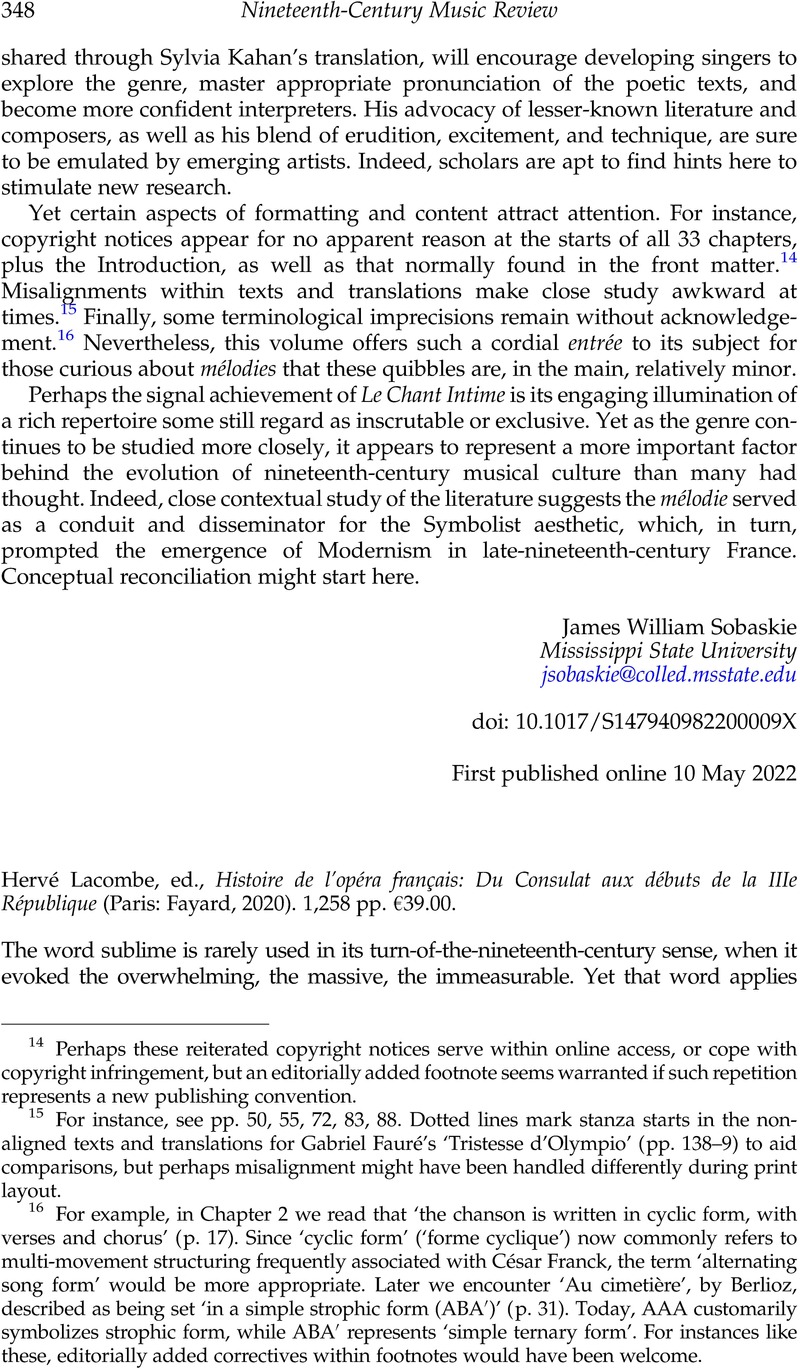No CrossRef data available.
Published online by Cambridge University Press: 10 May 2022

1 Lewis, Jon, American Film: A History, 2nd ed. (New York: Norton, 2019)Google Scholar.
2 See especially Barzun, Jacques, From Dawn to Decadence: 1500 to the Present: 500 Years of Western Cultural Life (New York: HarperCollins, 2001)Google Scholar. For a sample of his work on nineteenth-century music, see Berlioz and the Romantic Century, 2 vols (Boston: Little, Brown and Company, 1950).
3 Hervé Lacombe, Les voies de l'opéra français au XIXe siècle (Paris: Fayard, 1997), translated as The Keys to French Opera, trans. Edward Schneider (Berkeley: University of California Press, 2001). See also Lacombe, ‘The “Machine” and the State’, in The Cambridge Companion to Grand Opera, ed. David Charlton (Cambridge: Cambridge University Press, 2003): 21–42.
4 Jim Samson, ed. The Cambridge History of Nineteenth-Century Music (Cambridge: Cambridge University Press, 2001).
5 Jim Samson, ‘Editor's Preface’, in The Cambridge History of Nineteenth-Century Music, xiii.
6 There are notable exceptions: Richard Taruskin, The Oxford History of Western Music, vol. 3, The Nineteenth Century (Oxford: Oxford University Press, 2005); and Walter Frisch, Music in the Nineteenth Century (New York: Norton, 2013).
7 Richard Taruskin makes this observation about this volume less generously, see ‘Review: Speed Bumps’, in 19th-Century Music 29/2 (2005): 185–207.
8 This is – to be sure – a trend in French academic publishing. Other volumes with a similarly broad scope have used similarly thin paper. See Dominique Kalifa, Philippe Régnier, Marie-Ève Thérenty and Alain Vaillant, eds, La Civilisation du journal: Histoire culturelle et littéraire de la presse française au XIXe siècle (Paris: Nouveau Monde, 2011).
9 Examples of such focused dissertations include James Q. Davies, A Musical Souvenir: London in 1829 (PhD diss., University of Cambridge, 2005) and Delphine Mordey, Music in Paris, 1870–1871 (PhD diss., University of Cambridge, 2007).
10 Collingwood, Robin George, The Principles of Art (Oxford: Clarendon Press, 1938)Google Scholar.
11 Pierre Bourdieu, Distinction: A Social Critique of the Judgement of Taste, trans. Richard Nice (Cambridge, MA: Harvard University Press, 1987); Priscilla Parkhurst Ferguson, Accounting for Taste: The Triumph of French Cuisine (Chicago: University of Chicago Press, 2004); and Antoine Hennion, The Passion for Music: A Sociology of Mediation, trans. Margaret Rigaud and Peter Collier (London: Routledge, 2015).
12 Walter Benjamin, ‘The Paris of the Second Empire in Baudelaire’, in Selected Writings, vol. 4, 1938–1940, trans. Harry Zohn, ed. Howard Eiland and Michael W. Jennings (Cambridge, MA: The Belknap Press of Harvard University Press, 2003): 3–92; Walter Benjamin, The Arcades Project, trans. Howard Eiland and Kevin McLaughin (Cambridge, MA: The Belknap Press of Harvard University Press, 1999); and David Harvey, Paris, Capital of Modernity (New York: Routledge, 2003).
13 Frank Heidlberger, ‘Traces of the Past, or Visions of a Bright Future? Antoine Reicha's Music Theory and Hector Berlioz's Compositional Practice’, in Antoine Reicha, compositeur et théoricien: Actes du colloque international tenu à Paris du 18 au 20 avril 2013, ed. Herbert Schneider, Jean-Pierre Bartoli and Louise Bernard de Raymond (Hildesheim: Georg Olms Verlag, 2015): 185–98, Fabio Morabito and Louise Bernard de Raymond, ‘The Composer as Process’, in Antoine Reicha and the Making of the Nineteenth-Century Composer, ed. Fabio Morabito and Louise Bernard de Raymond (Bologna: Ut Orpheus Edizioni, 2021): vii–xxix; and Masci, Michael, ‘Theory as Practica: The Theoretical Study of Tonality and the Practical Study of Harmony in French Harmonie Pratique’, Theoria: Historical Aspects of Music Theory 20 (2013): 5–38Google Scholar.
14 For an overview, see Mathew, Nicholas and Smart, Mary Ann, ‘Elephants in the Music Room: The Future of Quirk Historicism’, Representations 132/1 (2015): 67–78CrossRefGoogle Scholar. For examples of scholarship that explores this intersection of historical and interpretive details, see Heather Hadlock, Mad Loves: Women and Music in Offenbach's Les Contes d'Hoffmann (Princeton: Princeton University Press, 2000); Benjamin Walton, Rossini in Restoration Paris: The Sound of Modern Life (Cambridge: Cambridge University Press, 2007); and Gabriela Cruz, Grand Illusion: Phantasmagoria in Nineteenth-Century Opera (Oxford: Oxford University Press, 2020).
15 Susan Rutherford, The Prima Donna and Opera, 1815–1930 (Cambridge: Cambridge University Press, 2009); Kimberly White, Female Singers on the French Stage, 1830–1848 (Cambridge: Cambridge University Press, 2018); Sean Parr, Vocal Virtuosity: The Origins of the Coloratura Soprano in Nineteenth-Century Opera (Oxford: Oxford University Press, 2021).
16 Derrida, Jacques, ‘Archive Fever: A Freudian Impression’, trans. Eric Prenowitz, Diacritics 25/2, (1995): 9–63CrossRefGoogle Scholar; Craig Robertson, ed., Media History and the Archive (New York: Routledge, 2015); and Francis Blouin and William Rosenberg, Processing the Past: Contesting Authority in History and the Archives (Oxford: Oxford University Press, 2011).
17 Craig Robertson, “Mechanisms of Exclusion: Historicizing the Archive and the Passport”, in Archive Stories: Facts, Fictions, and the Writing of History (Durham: Duke University Press, 2005): 71.
18 Recent research that has worked around such challenges creatively includes Blaszkiewicz, Jacek, ‘Listening to the Old City: Street Cries and Urbanization in Paris, ca. 1860’, Journal of Musicology 37/2 (2020): 123–57CrossRefGoogle Scholar; Claire Rowden, Opera and Parody in Paris, 1860–1900 (Turnhout: Brepols, 2020); and Tommaso Sabbatini, ‘Music, the Market, and the Marvelous: Parisian Féerie and the Emergence of Mass Culture, 1864–1900’ (PhD diss, University of Chicago, 2020).
19 See ‘Gallica’, https://gallica.bnf.fr/ (accessed 6 February 2022).
20 For an overview of Jann Pasler's project, see ‘The Sound of Empire in 20th-c. Colonial Cultures: Rethinking History through Music’, https://cordis.europa.eu/project/id/834195 (accessed 1 December 2021). See also ‘Carmen Abroad’, https://carmenabroad.org/ (accessed 1 December 2021).